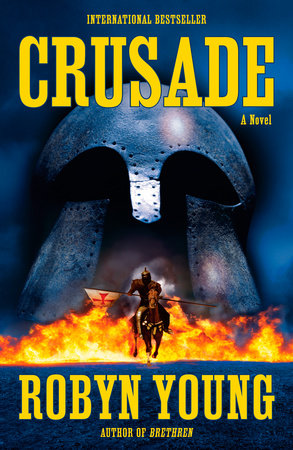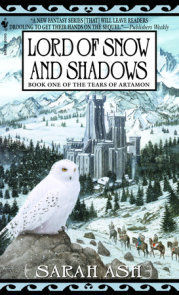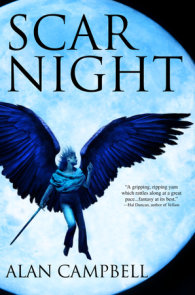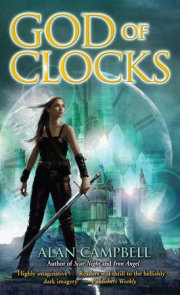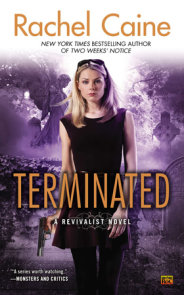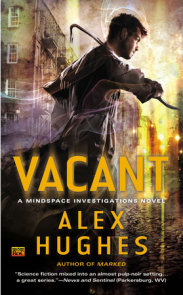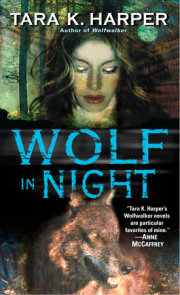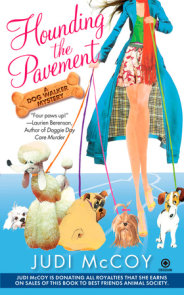READERS GUIDE
Questions and Topics for Discussion
NOTE: We recognize that reading is a personal experience, and we hope that the author interview and questions below will provide a springboard to provoke a lively discussion.
INTRODUCTION
For years, a secret society within the Templars, the Anima Templi, has dedicated itself to the preservation of peace between the three great religions of the world. William Campbell, one of the newest members to grace the halls of the Temple at Acre, has been intricately involved with the Anima Templi’s activities, but his past actions have caused his place within the society to be tenuous at best. Now, caught between trying to prove himself worthy of both the Templars and Anima Templi, and haunted by his past, he believes he’s stumbled upon a plot that could mean the end of the fragile peace that exists between the Muslim empire of the East and the Christian Crusaders.
At the same time, Kalawun al-Alfi, chief lieutenant to Sultan Baybars, is trying to maintain the peace from Cairo. Others in the royal court favor driving the Christians from the Middle East for good, but fortunately for Kalawun, Baybars is more preoccupied with keeping the Mongols from invading and taking any more of his vast empire. The Sultan won’t be distracted for long, though: his own son and heir, Baraka Khan, is being influenced and manipulated by members of Baybars’ court, and may prove the biggest challenge to the peace that Kalawun has fought so hard for.
In this sequel to Brethren, internationally bestselling author Robyn Young has continued to bring 13th century Europe and the Holy Land to life, peopling it with vivid characters that are complex, changing, and constantly engaging. Crusade is an epic within an epic, about the battle for the Kingdom of Jerusalem, and the political powers, truth seekers, and betrayers in the Middle East and beyond.
ABOUT ROBYN YOUNG
Robyn Young is the author of the internationally bestselling Brethren trilogy, which includes Brethren, Crusade, and the forthcoming novel Requiem. She has traveled extensively in Europe and Egypt and has a Masters in Creative Writing from the University of Sussex. During an eclectic career, she has been a creative writing teacher, financial advisor, folk singer, and music festival organizer. She lives in Brighton, England.
A CONVERSATION WITH ROBYN YOUNG
Q. Why historical fiction? What attracts you to the genre, and what do you see as its pitfalls and dangers (as a writer)?
It was the story of the Templars that first attracted me, rather than the genre itself. The interest in history I now have has been a result of this project rather than its cause. When I began work on the Brethren trilogy I hadn’t studied history since school. Back then it was Victorian architecture and Vietnam, neither of which resonated much in me. History was just facts and figures. I hadn’t understood that history is a story, is filled with stories, stretching back, decade upon decade, foundations of our culture, our countries, ourselves. I have always had a love of storytelling and it was immensely gratifying to see these rich narratives unfolding before me as I embarked on the research for the novels. There are, of course, pitfalls with this genre, and the further back in time you go the more challenging it can become. For a start, it’s very easy to get swept up in the history and the detail, more difficult to know when to stop reading and begin writing. Coupled with this, historical writers have to be wary of just how much research they put into the final text. I used only around a quarter of what I actually researched in the finished books. Too much detail can slow the pace of the story and so you’re always walking a fine line between being the historian and being the novelist. Obviously, there’s also the danger of getting your facts wrong, or not being able to easily find the information you want, which can mean delays. I do a great deal of work to ensure accuracy, and as a safety net I employ a historian to read the manuscript.
Q. Similarly, what attracted you to this particular time period? What about the Crusades appealed to your imagination? Did you intend to write about a period that reflected many of the same tensions that we’re experiencing today between the East and the West?
The knights initially attracted me to the period, in particular their dramatic downfall at the hands of the King of France in 1307, when they were accused of heresy. But soon after I began researching the Order of the Temple, the story expanded to include the great events and people of this time: the Crusades, royal assassinations, court intrigue, and political turmoil. I love the richness of the period and the feeling there must have been, as trade lines and borders opened up, that the world was new and waiting to be discovered. In the early stages I felt very much that I was covering ancient history. This was all before 9/11 and it was only after that point, when I was already working on the third draft of the first novel, that events in the book and events in the world began to reflect one another.
Q. How far do you see yourself going with this particular set of characters and time period, or will the series end withThe Fall of the Templars (due out in 2009)?
The Brethren trilogy ends with The Fall of the Templars, which covers events leading up to the Templars’ demise and the wars between England, Scotland, and France. That book is already finished and I’m about to begin a new trilogy on Robert the Bruce and the Scottish wars of independence, also set in this period. It’s a story of mystery, murder, family feuds, and turbulent romance, and one or two characters from the Brethren trilogy may well make an appearance!
Q. You used to teach creative writing. What was your single most important piece of advice for beginning writers? What have you learned since becoming an acclaimed novelist that you would stress to those writers who are attempting to get their first works published?
So many authors I know have had such different experiences when it comes to both the writing itself and to becoming published that it’s almost impossible to say exactly what enables an aspiring writer to do either. Some things all these published writers have in common, however, are perseverance, a willingness to polish and craft their work, and, perhaps most importantly, a deep desire to tell the story, to get it down on paper, to share it with the world. I think too many people assume it’s an easy thing to write and publish a novel. It isn’t. Finding an agent, then a publisher is a game of chance and a test of determination. There’s also a certain amount of luck involved and you can’t teach that. I would say first and foremost, write for yourself, not for the market (although being aware of it and its trends can be advantageous), be a reader, read everything, not just the genre you write in, and lastly, don’t be put off by rejections, they are the mark of a real writer, but at the same time, know when to leave one project and move on to the next. Above all, enjoy it!
DISCUSSION QUESTIONS
Crusade is filled with an extremely large cast of characters, many of whom we get to know intimately through the course of the novel. Which of these characters did you find the most compelling and complex? Would you have liked to see more of any one particular character?
When we are introduced to Will in the first part of the book, he’s under scrutiny from many of his fellow Brethren because of his volatile past. By the end of the book, he’s come to earn the respect of those whom he’d previously alienated. What were the most significant events that brought about this change? Which events changed Will most dramatically, and for the better?
Will’s relationship with Elwen is just as complex and changes significantly throughout the book. Is Elwen too forgiving of Will’s behavior? Did you see her as a strong character? Why? Discuss whether her betrayal with Garin and her deception regarding Rose’s paternity makes her a more realistic, but less likeable, character.
Will’s relationship with Garin is fraught with contradiction. He despises Garin for his behavior and past betrayal, and yet at certain times in the novel, he comes to Garin’s defense. What family dynamic does their relationship most closely resemble? At the end of the book, were you surprised when Will finally slew Garin, or had you expected him to let Garin live with his physical and emotional pain? Which is the worse fate—being stabbed in the back (literally), or having to live with physical and emotional torment?
Was Garin a sympathetic character? When he explains his past actions with Rook and King Edward, he is trying to make both Elwen and Will understand him, and to some extent pity him. At what points in the novel did you feel pity for his character? Which of his actions did you find most despicable and/or inexcusable? Did he meet a fitting end?
Aisha, Kalawun’s young daughter and Baraka Khan’s young wife, is a likeable character. In the short space of time that we know her, she reveals herself to be an intelligent, confident young woman who knows very much who she is and what she wants. Did her death in the early chapters of the novel come as a shock, and were you disappointed to see her die? Were there any other characters who met similar fates that shocked you?
Like Garin, Baraka Khan is a complex character who does despicable things but is also tortured by low self-esteem and a constant need for approval and a sense of belonging. At what points in the novel did you find him sympathetic? To what degree were his character flaws a direct result of Sultan Baybar’s (admittedly) poor parenting? Where else in the novel are father/son relationships (or friendships resembling father/son relationships), and their implications, explored?
Compare and contrast the relationships between Sultan Baybars and Kalawun and Kalawun and Nasir. While Kalawun’s involvement with the Anima Templi could have led to his execution, if he was discovered, do you think that he would have been forgiven by Baybars anyway? Did Baybars value Kalawun in the same way Kalawun valued Nasir?
Because of the subject matter, there are many violent scenes in the novel. How did they contribute to your understanding of the world back then? What did they reveal to you, or illustrate for you, that you weren’t aware of before? In particular, discuss the details of the final battle (the conquering of Acre by the Mamluks), and its most significant and/or revealing moments.
What parallels did you find between the 13th-century world political climate and that of the 21st century? Discuss the significance of the problems that occur in both centuries—and what these problems say about human nature and our ability to change and learn from past mistakes.







